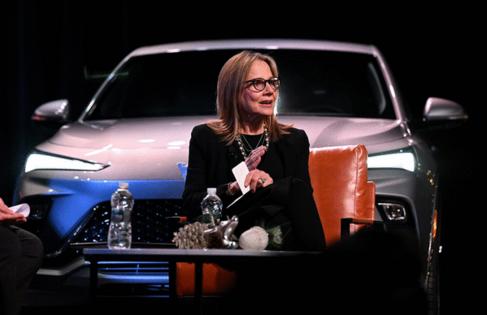GM says tariff impact could hit $5 billion, plans no big price hikes
Published in Business News
General Motors Co. said Thursday that it's lowering profit expectations for the year but does not plan major price hikes, a sign of lingering pain that tariffs are inflicting on the U.S. auto industry despite some relief this week from President Donald Trump.
The Detroit automaker now projects full-year adjusted earnings before interest and taxes of $10 billion to $12.5 billion. GM previously predicted 2025 adjusted EBIT between $13.7 billion and $15.7 billion, but those estimates did not factor in Trump's 25% tariffs on automobiles and auto parts, the latter of which takes effect Sunday.
The guidance includes current tariff exposure of $4 billion to $5 billion, which CEO Mary Barra said the company expects to offset by about 30% in part by tightening budgeting and moving more supplies and manufacturing to the United States.
"We understood from the early discussions I had directly with the president that he had a very strong goal to strengthen manufacturing in this country," Barra said after repeatedly praising Trump during a Thursday call with analysts. "We want to be a part of that. So we haven't thought of this as a chaotic environment."
GM's rival, Ford Motor Co., on Thursday reported a 16% increase year-over-year in U.S. sales in April, and Stellantis NV said Wednesday that it has suspended its full-year earnings forecast due to "tariff-related uncertainties." The transatlantic automaker reported another tough quarter with revenue down 14% to $40.7 billion (35.8 billion euro) from a year ago.
"All that calculation shows that it's going to cost them tens of millions of dollars per vehicle, even if they're built in the U.S.," said Sam Fiorani, vice president of global vehicle forecasting at AutoForecast Solutions LLC.
Morningstar strategist David Whiston said that with Trump's actions this week to soften tariffs, the U.S. auto industry is "still worse off than having no tariffs, but better than a few weeks ago."
"They're not looking to raise prices necessarily on consumers further," Whiston said. "But that could be in jeopardy if consumers really start to have a real freakout about all the inflationary pressures that they're having, not just with autos, but everything."
Automakers and independent analyses have indicated that the tariffs could raise prices, reduce sales and make U.S. production less competitive worldwide.
Under an executive order Trump signed Tuesday, the 25% tariffs on autos and certain parts will not be stacked on aluminum and steel tariffs, or upon general tariffs on Canada and Mexico. He also granted automakers credit to offset 25% duties on imported auto parts used in vehicles assembled in the United States.
Trump has portrayed the changes as a bridge toward automakers moving more production into the United States, but companies face lengthy timelines and extensive costs to do so.
"Finding new plants to assemble those vehicles will absolutely take a long time and require hundreds of millions of dollars of investment if they can find existing plants to build them," Fiorani said. "It's very likely that if they don't raise prices on vehicles, they will lose money on some of these imports or eliminate them from their lineup altogether."
GM responded to tariffs by upping truck production recently at its Fort Wayne, Indiana, plant. Barra said Thursday the automaker will also work to source more supplies domestically and increase U.S. battery output as it forges ahead with its commitment to electric vehicles.
German automaker Mercedes-Benz Group AG plans to build another vehicle at its U.S. factory near Tuscaloosa, Alabama, by 2027 in response to tariffs, Bloomberg reported Thursday.
Auto industry expert Patrick Anderson of the East Lansing-based Anderson Economic Group said in a statement that Trump's tariff relief will mean "significant and beneficial softening of the cost impact of these tariffs, at least for US-assembled vehicles."
Anderson gave these examples: The Illinois-assembled Ford Explorer will see a tariff of about $2,400, down from $4,300; GM's full-size Chevy Suburban, GMC Yukon and Cadillac Escalade SUVs built in Texas will face a roughly $8,000 levy, down from more than $11,000, and the Mexico-assembled Ford Mustang Mach-E will still see a tariff above $12,000.
"However, the cost is still substantial for most American cars and trucks," he said. "We do not expect consumers to absorb tariff costs that are still above $4,000 for many models, and above $10,000 for luxury vehicles imported from Europe and Asia.”
Ford CEO Jim Farley on Wednesday told Fox Business that his company "never left" the United States in terms of car production — a not-so-subtle jab at rivals GM and Stellantis, which import a higher proportion of their models for U.S. sale.
"This moderation is reasonable, mostly for our competitors," Farley said regarding Trump's relaxation of auto tariffs. "They need more time. But at Ford, we're in good shape."
©2025 www.detroitnews.com. Visit at detroitnews.com. Distributed by Tribune Content Agency, LLC.












Comments